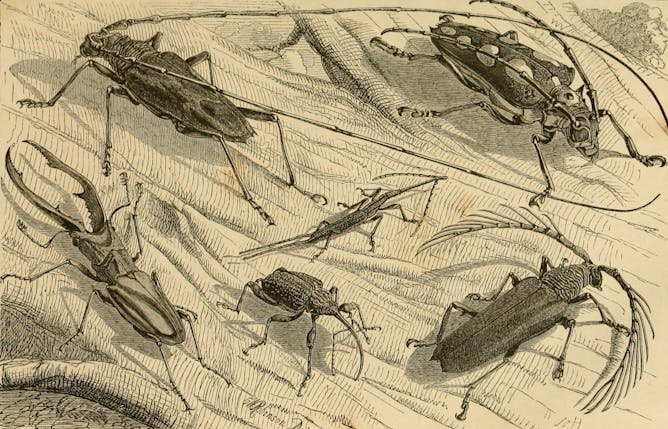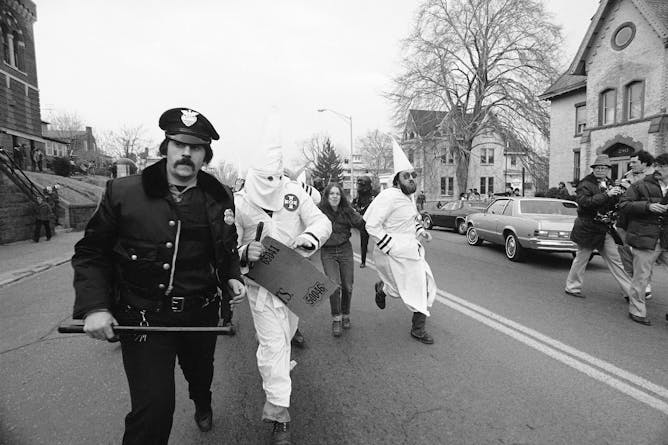Editor's note
|
|
Some of today’s most popular video games are pixelated classics from the 1970s and 1980s. Gaming psychology scholars Nicholas Bowman and Tim Wulf explain the role of nostalgia in the survival of these retro games – and how it might even help gamers strengthen their connections with others.
This summer, evolutionary biologist Giacomo Bernardi made a personal pilgrimage to the remote place where a 19th century Englishman puzzled through the mechanics of natural selection. Surprise: It wasn’t the Galapagos Islands made famous by Charles Darwin. It was a jungle mountaintop in Borneo, where relatively unknown naturalist Alfred Russel Wallace wrote down his insights in 1855 and sent them to Darwin – who realized
he’d be scientifically scooped if he didn’t publish his own theory of evolution on the double.
Spike Lee’s new film, “BlacKkKlansman,” tells the story of a black cop, Ron Stallworth, who successfully manages to infiltrate a local branch of the Ku Klux Klan. Lee’s film brought Boston University journalism professor Dick Lehr back to his days as a young reporter for The Hartford Courant, when KKK Grand Wizard David Duke launched a Connecticut recruitment effort in the fall of 1979. Lehr tells the story of how he
decided to fill out an application to become a member of the KKK, attend a secret meeting, and write an article about what he discovered.
|
Jeff Inglis
Science + Technology Editor
|

|
|
Top stories
|

Instruments of nostalgia and psychological well-being?
Brian Kenney/Shutterstock.com
Nicholas Bowman, West Virginia University; Tim Wulf, University of Cologne
As retro video games become more popular, research suggests players could be looking for nostalgia – and the psychological benefits it brings.
|

Some of the ‘remarkable beetles’ Wallace collected in Borneo.
A. R. Wallace
Giacomo Bernardi, University of California, Santa Cruz
An evolutionary biologist visits the remote jungle mountaintop where a little-known naturalist wrote his insightful paper about the mechanisms of evolution that spurred on a rivalrous Charles Darwin.
|

Connecticut members of the Ku Klux Klan, escorted by Meriden, Conn. police, run for shelter as protesters pelt them in March 1981.
AP Photo
Dick Lehr, Boston University
In 1979, David Duke told the media he had launched a wildly successful recruiting drive in Connecticut. A local reporter wanted to test Duke's claims – so he filled out an application to join the KKK.
|
|
|
|
|
|
|
|
|
|
|
Ethics + Religion
|
-
Hanna Shaul Bar Nissim, Brandeis University
Israel's increasingly conservative policies on social and religious issues appears to be playing a role.
-
Adil Najam, Boston University
The partition of India led to more than a million deaths. One man, Lord Louis Mountbatten, who hurriedly drew the new borders in secret, is largely responsible.
-
Haimanti Roy, University of Dayton
At midnight on August 15, 1947, India achieved freedom from more than two centuries of colonial rule. Hours earlier, Pakistan was declared a new nation. Was partition inevitable?
|
|
Trending on site
|
-
Richard G. "Bugs" Stevens, University of Connecticut
A jury concluded on Aug. 10 that exposure to the herbicide Roundup caused Dewayne Johnson's cancer and ordered the company to pay $289 million in damages. Thousands more claims are pending.
-
Andrew Spicer, University of South Carolina; David Graham Hyatt, University of Arkansas
Two business professors spent five years studying Walmart's ambition project to bring sustainability to its millions of budget-conscious customers – a plan that began with the birth of a granddaughter.
-
Bruce Blumberg, University of California, Irvine; Raquel Chamorro-Garcia, University of California, Irvine
The most common explanation for obesity is overeating calorie-rich foods and a sedentary lifestyle. But new studies suggest that chemicals in our environment might be another cause.
|
|
|
|
| |
| |
|
|